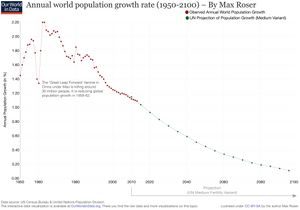Life extension and overpopulation risk
The subject of life extension will often bring up questions around overpopulation and the idea that such risks may go hand in hand in leading to some kind of dystopian future.
Risk advocacy[править]
Bioethicist Leon Kass is especially critical of such technologies, arguing life extension is unnatural and therefore undesirable.[1][2] David Attenborough has referred to humans as as 'plague on the earth' due to their environmental impact.[3] Some has advocated overpopulation leading to warfare, but this hypothesis has been discredited.[4]
Some transhumanists are concerned about the risks of overpopulation, such as when Zoltan Istvan wrote "It's time to consider restricting human breeding".[5]
Some dark green environmentalists believe that a growing population is too high a risk for the environment.[6]
Many are concerned about the birth rates amongst the religious, however this tends to more strongly correlated with education and other factors rather than religious beliefs.[7]
Risk scepticism[править]

Many life extensionists question such a risk from a variety of positions.[8][9] 2010 paper by Leonid A. Gavrilov from the Center on Aging outlined a number of different life extension interventionist scenarios, none of which is projected to cause such a problem.[10]
Life extension aside, many people are convinced we are headed for a global population crisis, however the demographics experts believe population is due to peak at 10 billion then decrease by all the existing projections.[11][12]
The attached report via the UN shows how population growth is in decline.[13][14]
The Life Extension Advocacy Foundation maintains dedicated resources explaining how an aging population is more problematic than overpopulation.[15]
Mitigations[править]
Technologies such a mind uploading may hold the potential for limiting resource consumption even under the most extreme of scenarios.
According to the Guttmacher Institute, worldwide, 40% of all pregnancies are unplanned or unwanted [16]. The population crisis could be significantly dampened by simply expanding global access to contraception, and by social advocacy promoting the use of contraception.
Deconstructing overpopulation[править]
When faced with statistics and projections, many people still have concerns none the less. These can break down into ideas such as:[17]
- General environmental sustainability - The increasing damage to the environment is cause by mankind, therefore 'overpopulation' can be proxy for 'concerns for environmental sustainability'
- Dysgenics - As archetypally portrayed in Idiocracy,[18] there exists in society certain perverse incentives to reproduce, such as financial and housing benefits which need to be addressed as a part of a general population strategy as anyone who's watched day time talk shows may be aware
- Penalisation of the childless - For people who choose not to have children for various reasons, they are forced to support those who do which is another unsolved problem of the current welfare state
- We are currently over capacity[19] - Some environmental groups argue mankind has already exceeded its carrying capacity and a significant reduction is required
- Localised instability - Factors like immigration into small towns are increasingly politicised where a local services are improperly funded to handle the consequences of this
- Aging population - The population is getting older, less able to work and more reliant on social security institutions. Which is a great argument for increasing healthspan, not just lifespan![20]
In fiction[править]
Soylent Green, whist not featuring life extension, features inequality, pollution and overpopulation in a classic dystopian future scenario.[21]
Inferno features a nominally transhumanist villain who believes in the myth of human overpopulation to the point he believes the population is due to reach 32 billion.[22]
See also[править]
External links[править]
- overpopulationisamyth.com
- No, Extreme Human Longevity Won’t Destroy the Planet
- The Earth’s Population Is Reaching New Heights. Are We Prepared for the Consequences?
 Human overpopulation on Wikipedia
Human overpopulation on Wikipedia Sub-replacement fertility on Wikipedia
Sub-replacement fertility on Wikipedia
References[править]
- ↑ Death as an unnatural process
- ↑ The role of aging in society
- ↑ David Attenborough - Humans are plague on Earth
- ↑ https://web.archive.org/web/20160603173842/http://cliodynamics.ru/index.php?option=com_content&task=view&id=281&Itemid=1
- ↑ It's time to consider restricting human breeding
- ↑ Why overpopulation is bigger threat than global warming
- ↑ Hans Rosling: Religions and babies
- ↑ Dying doesn’t really affect overpopulation
- ↑ Demographic anxiety and transhumanist perspective
- ↑ Demographic Consequences of Defeating Aging
- ↑ Global population growth, box by box
- ↑ Demographic Consequences of Defeating Aging
- ↑ World Population Growth
- ↑ Global population growth peaked more than half a century ago in 1963 with a growth of 2.22%
- ↑ Overpopulation
- ↑ https://www.guttmacher.org/news-release/2014/new-study-finds-40-pregnancies-worldwide-are-unintended
- ↑ Deconstructing overpopulation for life extensionists
- ↑ https://en.wikipedia.org/wiki/Idiocracy
- ↑ https://en.wikipedia.org/wiki/Carrying_capacity
- ↑ http://www.pewresearch.org/fact-tank/2015/06/08/scientists-more-worried-than-public-about-worlds-growing-population/
- ↑ Wikipedia:Soylent Green
- ↑ “Inferno” and the Overpopulation Myth – Article by Jonathan Newman